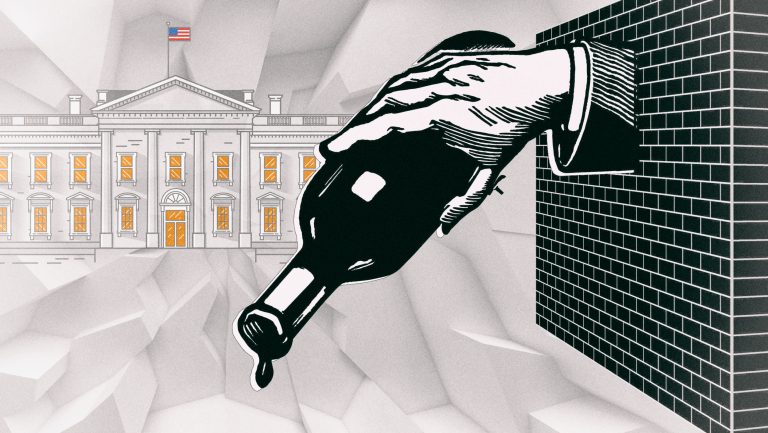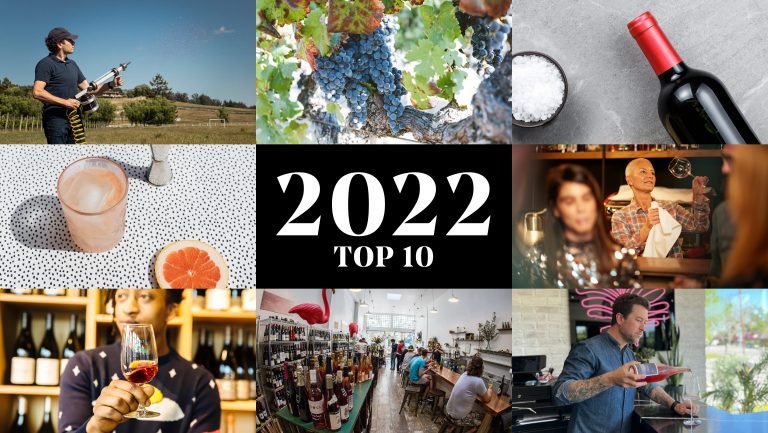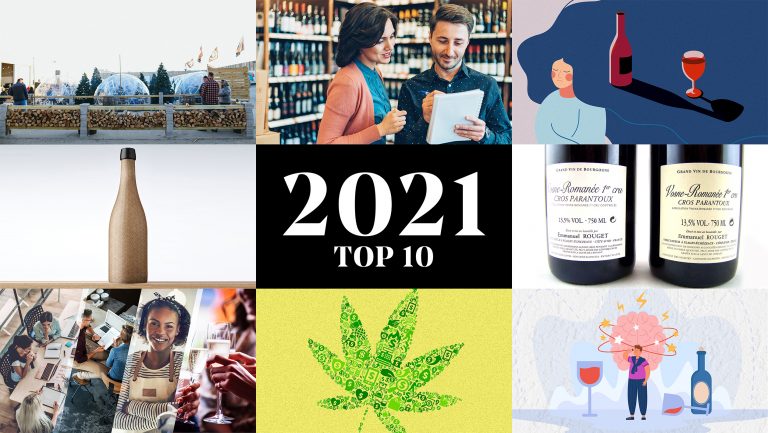Donald Trump may have called a ceasefire in his border-wall war with Congress, but the fight is far from over, and the losses keep piling up, even for industries that don’t depend directly on the government for a healthy bottom line—such as the drinks trade.
On Monday the nonpartisan Congressional Budget Office (CBO) released a report that estimated the cost of the government shutdown to the U.S. economy to be $11 billion, $3 billion of which will never be recovered. SevenFifty Daily’s conversations with beverage alcohol producers—some of whom have already lost up to $1 million—reflect that finding; while the exact amount of money lost is uncertain at this point, it’s clear that much of it won’t be recovered.
To make matters worse, the specter of another costly shutdown is looming: Trump himself told the Wall Street Journal over the weekend that he puts the chances at “less than 50-50” that he and Congress will be able to arrive at a compromise by February 15 that will keep the government open.

Don’t miss the latest drinks industry news and insights. Sign up for our award-winning newsletters and get insider intel, resources, and trends delivered to your inbox every week.
We spoke with members of the drinks industry to gauge the effect of the 35-day shutdown so far, and to get a handle on how the losses could worsen if Trump and congressional lawmakers can’t shake on a compromise by mid-February.
Why the Shutdown Matters
The mission of the Alcohol and Tobacco Tax and Trade Bureau (TTB) is to protect the public by enforcing provisions of the Federal Alcohol Administration Act. In practice, that means the drinks industry needs the government’s approval to release new products, send samples to clients, ship products, advertise, and to open up new businesses. On Monday, January 28, when federal workers returned to their jobs, they faced large backlogs. TTB workers were tasked with clearing pending applications for all of the above.
Last year the TTB received 192,000 applications for new lines of wine, spirits, and beer; if approval were sought for roughly the same number of new products this year, that means the shutdown would have shelved more than 18,400 new releases. In addition, imports, exports, and shipments across state lines that hadn’t been approved before the shutdown have also been paused.
According to the TTB’s website, the average wait time for processing new distilled spirits labels is 40 days; for malt beverages, 49; and for wines, 41. The TTB is currently processing applications for distilled spirits received on December 24; for malt beverages, on December 13; and for wine labels, on December 20.
Spirits
Sales of distilled spirits totaled $26.2 billion in 2017, which represents a $1 billion increase year-over-year from 2016, according to the most recent numbers available from the Distilled Spirits Council.
While the precise impact of the shutdown is tough to quantify, new products, brands, and facilities are the engine driving that multibillion-dollar figure, says Matt Dogali, the president of the American Distilled Spirits Association, an organization, based in Washington, D.C., representing 28 businesses that together produce more than half of the distilled spirits in the U.S.
“Some of our member companies have already reported losses as great as several millions of dollars,” Dogali says. “Our member companies have hundreds of applications pending, so the fiscal impact will continue to grow even as the TTB returns.”
Dogali predicts that the TTB’s backlog of already-submitted applications will create a traffic jam preventing the approval of new applications for labels and imports and potentially impact businesses with loans for expansions or improvements that were put on hold.
“Even basic, everyday operational activities like grain supply shipments have been held up,” Dogali says, adding that the domino effect of the longest shutdown in U.S. history will continue.
If Trump and Congress’s truce proves to be temporary, which Dogali sees as a strong possibility, he worries that the “awful disruption” could snowball into a full-blown catastrophe for the industry.
Matti Anttila, the founder and CEO of Grain & Barrel Spirits, a craft spirits company based in Florida and South Carolina, tells SevenFifty Daily that if the label delays continue, his business could lose $1 million in sales; thus far, he estimates, the shutdown has probably cost the company $250,000. “For some of my colleagues with large [first-quarter] releases, the cost will be well into the millions,” Anttila says. “[This amount] stems from lost revenue, delayed activation, prepaid commitments—it’s an absolutely material impact for any producer launching new items this quarter.”
Beer
“The shutdown has had an outsize effect on brewers,” says Sarah Bryan, the operations manager of Earth Eagle Brewings, a craft brewery and homebrew supply shop in Portsmouth, New Hampshire, and a board member of the New Hampshire Brewers Association. More than 80 breweries are members of the NHBA, with 10 new breweries set to join once their permits and paperwork are approved by the TTB. “Brewers thrive on fast-paced innovation,” says Bryan, “and several new products my fellow brewers and I have made recently have not been able to reach market or cross state lines, because that requires TTB approval.”
Maggie McClain, a rep for the legislative affairs wing of the Brewers Association, based in Boulder, Colorado, says the organization won’t be able to assess the full damage of the shutdown until it’s clear how quickly the TTB will be able to process its current backlog of applications. “Beer brands that require a Certificate of Label Approval (COLA) or a formula approval have not been able to receive them, so new releases won’t hit stores,” she says, adding that last year, the TTB processed more than 34,000 beer labels and 2,050 formulas, and saw an increase of more than 1,200 Brewer’s Notices (the permit required to open a brewery). If the same numbers apply this year, the shutdown will have affected more than 3,570 products or breweries; if the TTB is unable to clear its backlog quickly, that number will climb.
While Bryan hesitates to hazard more than a guess at the cost to her business and those of her fellow New Hampshire brewers, she says that after the dust settles, it will likely be well into the millions.
“It’s especially harmful,” Bryan says, “for a few of the new breweries I know here that have to start paying back loans on just-built structures that are standing empty because of the shutdown.” She explains that these businesses can’t open their doors to the public, or even produce new beer for sale elsewhere, without the TTB’s approval.
There are several legislators who have craft brewers’ ears. Congressmen Peter A. DeFazio (D-OR), Patrick T. McHenry (R-NC), and Mike Kelly (R-PA), cochairs of the House Small Brewers Caucus, wrote a letter to TTB administrator John Manfreda, dated January 24, 2019, in which they laid out their concerns and recommendations.
The congressmen began by sketching a brief picture of the growing craft beer industry, which currently supports more than 7,100 small and independent breweries with more than 135,000 employees; all told, they wrote, the craft beer industry contributes $70 billion annually to the U.S. economy. Without the TTB’s cooperation, industry members are unable to innovate, expand facilities, or participate in other activities that “foster economic growth.”
The congressmen urged the TTB to “exercise temporary enforcement discretion, just as TTB has done previously in the wake of natural disasters and other catastrophic events.” In the case of COLAs, they urged the TTB to notify members of the industry to move forward with new labels, registered businesses, exports, and permits without official approval, as long as their paperwork has been submitted, until the agency has cleared the backlog.
Tom Hogue, the TTB’s director of congressional and public affairs in Washington, D.C., responded to SevenFifty Daily’s request for comment, saying, “We are still assessing the overall impact of the shutdown, but I can tell you that our backlog for permits, formulas, and labels roughly doubled as a result.” As for the TTB’s strategy for tackling the pileup, Hogue says, “We’re doing the best we can as fast as we can to return to the service standards our stakeholders have come to expect,” adding that the TTB has published a message regarding its recovery efforts on its website.
While breweries wait for business as usual to pick up, life goes on. This weekend, Boston’s annual Extreme Beer Fest, a trade show hosted by Beer Advocate, featuring more than 120 breweries and with an expected crowd of 12,000, will commence, bereft of a handful of brewers and several new beers.
Bryan says that Earth Eagle will attend—almost all the products the brewery planned to serve were approved before the shutdown—but that she knew of several other breweries that either pulled out or had to fall back on old recipes that craft enthusiasts were already familiar with.
All of the affected brewers and beers have been swapped out, says Beer Advocate’s founder, Todd Alström. While the Extreme Beer Fest will go on as scheduled, he predicts that the TTB’s clearing of the backlog in the months ahead will be a time-and-money-consuming “nightmare” for brewers and other festival organizers.
Bryan’s forecast is also dismal.
“Maybe it’s because I work near naval yards, and I’ve seen firsthand the impact of this on furloughed federal workers,” she says. “But I see long-ranging consequences for the industry, especially since this is the second major hit we’ve taken.”
The first hit, Bryan says, has been Trump’s trade war with China. “Brewery parts are going up [in price] across the board,” she says, “because we can’t depend on inexpensive Chinese steel anymore.”
Wine
The shutdown’s effect on the wine industry has been slightly more muted, but only just.
James MacPhail, the founder of Tongue Dancer Wines in Healdsburg, California, says that some of the fallout from the shutdown has been disastrous for small businesses like Tongue Dancer, which produces approximately 800 cases per year. “For small family producers,” he says, “not being able to label new wines means they can’t finish bottling them or get them out.”
Many winemakers we spoke with said that their shipping schedules and spring label releases were approved before the shutdown, but others fared less well. Take, for example, winemakers in Italy’s Chianti Classico region. Massimo Tonini, the sales and marketing director for Ricasoli, a producer located in the commune of Gaiole in Chianti, explains that the appellation as a whole currently ships one out of every three bottles of Chianti Classico Riserva produced to the U.S.
“Ricasoli alone produces 180,000 cases annually, and about 75 percent of that is exported,” he says. “The U.S. is our second-largest market, and the shutdown has stalled approval for a few of our spring releases, including our rosé.”
And it’s the smaller and newer wineries that will bear the brunt of the shutdown’s effect. Justin Fenchel, the cofounder and CEO of BeatBox Beverages, a company based in Austin, Texas, that produces wine-based punch products, says the shutdown has affected at least two of its product launches and will cost BeatBox “close to $500,000 in 2019, with far-reaching implications beyond.”
Fenchel adds that BeatBox currently has “$350,000 in preorders for new lines, and missing those deadlines could be a death sentence for our company.” He believes the shutdown put BeatBox behind by at least six months.
While the industry—and the economy as a whole—will come back from the shutdown, the blow has been significant and may be impossible to eradicate completely. And if the truce doesn’t hold, some of the injuries to the drinks industry may, inevitably, turn fatal.

Dispatch
Sign up for our award-winning newsletter
Don’t miss the latest drinks industry news and insights—delivered to your inbox every week.
Kathleen Willcox is a journalist who writes about food, wine, beer, and popular culture; her work has appeared in VinePair, Edible Capital District, Bust magazine, and Gastronomica, and on United Stations Radio Networks, among other venues. She recently coauthored, with Tessa Edick, “Hudson Valley Wine: A History of Taste & Terroir.” She lives in Saratoga Springs, New York.







